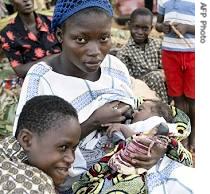2006年VOA标准英语-Conference Blames Culture, Poverty, War for Afr(在线收听)
By Efam Dovi
Accra
15 November 2006
A conference of African population experts in Ghana says unless deep-rooted cultural practices, ignorance, and war are addressed, efforts to save the lives of thousands of women who die each year from complications of pregnancy and childbirth, will be wasted.
----
The experts, attending the Africa Population Commissions West African regional conference, said safe motherhood should be of concern to everyone because for every maternal death, someone has lost a spouse, a sister, a mother or a child.
They said, while maternal deaths have decreased significantly in developed countries, there has been little or no improvement in sub-Saharan Africa, especially in the West Africa region.
 Togolese refugee Asadonde Afi, 17, breastfeeds her baby in Lokossa refugee camp in Benin (file photo) |
||
Professor Angela Okolo represented the West African Health Organization. She says while it is important to enact laws to stop some of the harmful cultural practices, the public also needs to be educated.
"We [WAHO] are at the point of getting advocacy tools adopted to address certain issues because definitely in this area of reduction of maternal mortality and perinatal mortality, advocacy has a lot of role to play, its not just by enacting laws that we can achieve," she said.
Ghana's national family planning program manager, Dr. Gloria Quansah Asare, says ignorance about contraceptives is contributing to unsafe abortions, which are blamed for 30 percent of maternal deaths in the region.
She says more community-based health officers need to be trained, to address some of the bottlenecks in the delivery of reproductive health services.
"There are delays, delays from the home decision making on when to even bring a woman in labor or a pregnant woman to the facility, once the decision has been made, delays in even transporting the person, and once they get into the facility, delays and sometimes lack of things to get the best care to the person," Dr. Asare said.
Larry Younquoi, director at Liberia's population policy coordinating unit, said many years of conflict have destroyed health infrastructure in Liberia, describing the maternal health situation in that country as appalling. He stressed the need for the government to step-up support for the sector, adding that the issue of ignorance is also being fought.
"We have launched a media campaign, through drama, radio clips and print media, where we are trying to sensitize and educate Liberian people about all these indicators, so ignorance is being fought seriously through a lot of publicity and other conferences that we are currently holding," he said.
For three days, the more than 200 experts from across Africa, discussed how to make motherhood safer in West Africa, where 120,000 women continue to die each year from complications of pregnancy and childbirth.